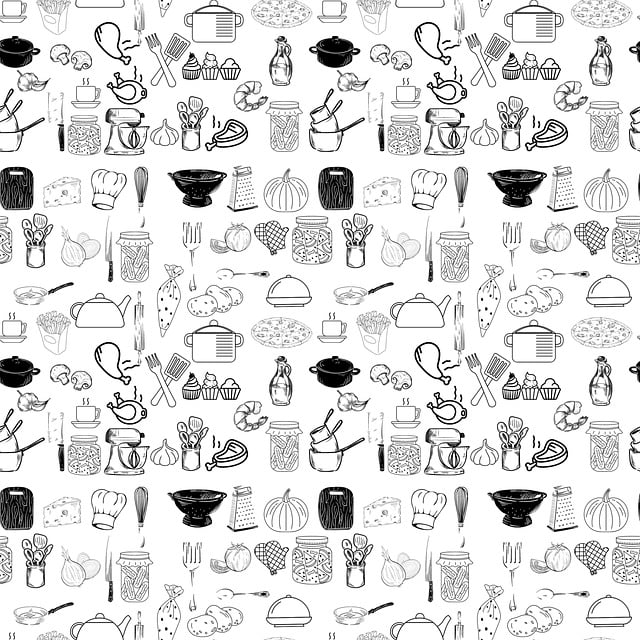Revolutionize your kitchen with energy-efficient gadgets for a greener culinary experience. Embrace smart devices with precise temperature control, LED lighting, water-saving faucets, and solar-powered tools. These eco-friendly options reduce energy and water consumption while minimizing waste, benefiting both your wallet and the environment. Integrate these kitchen accessories for an efficient, sustainable, and functional space that supports ecological sustainability.
In today’s digital era, embracing high-efficiency kitchen gadgets isn’t just a trend—it’s a step towards sustainable living. Revolutionize your culinary space with energy-efficient accessories that slash environmental impact while offering numerous benefits. From eco-friendly cookware reducing your carbon footprint to LED lighting and smart devices enhancing convenience, these innovations transform your kitchen into an environmentally conscious oasis. Additionally, water-saving faucets and solar-powered tools further contribute to a greener lifestyle. Discover how these sustainable gadgets can make a difference in your daily routines.
- Revolutionizing Your Kitchen with Energy-Efficient Gadgets
- – Overview of energy-efficient kitchen accessories and their environmental impact
- – Benefits of integrating energy-saving kitchen appliances into daily routines
- Sustainable Cooking: The Eco-Friendly Cookware Option
Revolutionizing Your Kitchen with Energy-Efficient Gadgets
Revolutionizing Your Kitchen with Energy-Efficient Gadgets
Transform your culinary space into an eco-friendly haven by embracing energy-efficient kitchen accessories. These innovative devices are designed to reduce environmental impact while optimizing your cooking experience. Switch to smart kitchen devices that offer precise temperature control and efficient power usage, ensuring every meal is cooked perfectly without unnecessary energy waste.
Consider sustainable cookware made from recycled or plant-based materials, which not only cuts down on resource consumption but also provides excellent heat retention. LED kitchen lighting offers bright, long-lasting illumination while consuming less electricity than traditional bulbs. Additionally, water-saving kitchen faucets with advanced flow regulators can significantly reduce your water footprint without compromising cleaning power. Even solar-powered kitchen tools are now available, harnessing renewable energy to charge devices like hand mixers or blenders.
– Overview of energy-efficient kitchen accessories and their environmental impact
Energy-efficient kitchen accessories are a growing trend among those committed to sustainable living. These eco-friendly kitchen gadgets not only reduce energy consumption but also minimize environmental impact by lowering water usage and eliminating unnecessary waste. Energy-saving kitchen appliances, such as LED kitchen lighting, offer long-lasting brightness with significantly lower energy requirements compared to traditional bulbs. Similarly, smart kitchen devices leverage technology to optimize resource use, ensuring every task is executed efficiently without excess.
Sustainable cookware, designed with materials like stainless steel or cast iron, lasts longer than disposable options, reducing the need for frequent replacements. Water-saving kitchen faucets employ innovative technologies to minimize water flow while maintaining functionality, contributing to significant conservation efforts. Even solar-powered kitchen tools are now available, harnessing renewable energy to power small appliances, further diversifying the array of energy-efficient kitchen accessories available to consumers.
– Benefits of integrating energy-saving kitchen appliances into daily routines
Integrating energy-efficient kitchen accessories into daily routines offers a multitude of benefits for both your wallet and the environment. Eco-friendly kitchen gadgets, such as LED kitchen lighting, not only reduce electricity bills but also minimize your carbon footprint by consuming less power. Water-saving kitchen faucets are another excellent example—they significantly cut down water wastage without compromising functionality, contributing to global water conservation efforts.
Smart kitchen devices and solar-powered kitchen tools further enhance sustainability. These innovative products leverage technology to optimize resource usage. For instance, smart appliances can be programmed to operate during off-peak energy hours, taking advantage of lower electricity rates. Solar-powered alternatives, on the other hand, harness renewable energy from sunlight, eliminating the need for conventional power sources and promoting a greener lifestyle.
Sustainable Cooking: The Eco-Friendly Cookware Option
In today’s world, sustainable living is a growing trend, and the kitchen is no exception when it comes to embracing eco-friendly practices. One of the key aspects of this shift is choosing energy-efficient kitchen accessories that reduce environmental impact. Eco-friendly kitchen gadgets, such as energy-saving induction hobs and smart kitchen devices equipped with LED kitchen lighting, not only cut down on electricity bills but also minimize waste by optimizing cooking processes.
Additionally, sustainable cookware made from recycled or plant-based materials is making headlines. These options are often free from harmful chemicals and reduce the carbon footprint associated with traditional cookware production. Water-saving kitchen faucets and solar-powered kitchen tools further contribute to this eco-friendly revolution, ensuring that your culinary adventures are both efficient and environmentally conscious.
By adopting high-efficiency kitchen gadgets and making the switch to eco-friendly alternatives like sustainable cookware, LED kitchen lighting, and water-saving kitchen faucets, we can significantly reduce our environmental footprint. Smart kitchen devices and solar-powered tools further enhance these efforts. Integrating energy-saving kitchen appliances into daily routines not only benefits the planet but also leads to long-term cost savings. Small changes in our cooking habits, such as those discussed here, contribute to a greener future for all.
